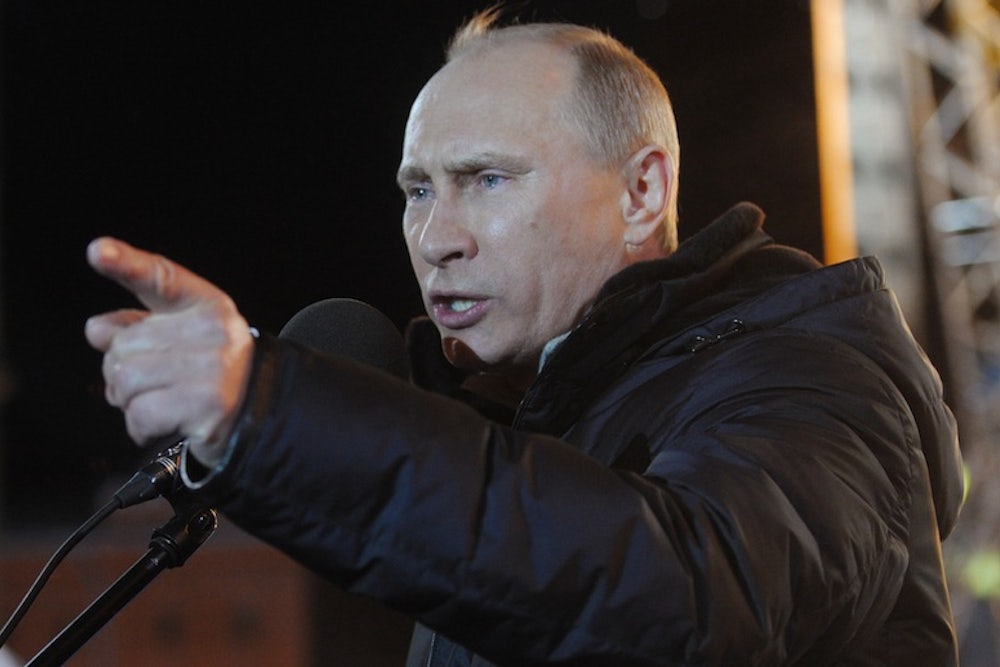As you read this, the Kremlin is preparing for the Winter Olympics by pushing Dozhd TV, Russia’s last independent television station, off a cliff. Pressured by phone calls from the Kremlin’s top deputies and Vladimir Putin’s closest—and scariest—buddies, Russian cable and satellite operators are excising Dozhd from their bundles. Mikhail Zygar, Dozhd’s editor-in-chief, estimates that, in the last three days, the channel has lost over half of its national coverage. As a result, advertisers are running for the hills and Dozhd is bleeding money. The channel, which exists in an ad market massively skewed by politics and fears of Kremlin reprisal, was already a money-losing venture, and it continued to survive through the largesse of its owner, businesswoman Natalia Sindeeva and her husband. This latest government offensive, however, could easily prove fatal for the scrappy young station, which employs about 300 young, often idealistic journalists and business staffers.
Dozhd, whose name means "rain" in Russian, has been around since the spring of 2010, long after all independent television in Russia had been systematically wiped out. The trouble started on January 26, when Dozhd aired its usual program produced in partnership with the historical journal Dilettante. It was to mark the 70th anniversary of the end of the infamous Nazi blockade of Leningrad, which, over the course of 872 days, took the lives of nearly 1 million Soviet citizens, mostly from starvation and disease. It is a sacred topic in Russia, but one that, recently, is starting to be reevaluated by Russian historians. They have been asking if the blockade and its massive death toll could have been averted by letting the city fall to the Germans, much like so many other Soviet cities at the time. The question has even been asked in state-approved high school textbooks.
And yet, when Dozhd posted the question in the form of an online poll, the outrage poured down. Kremlin loyalists in the Russian parliament said the poll should be seen as an attempt “to rehabilitate Nazism.” Other lawmakers considered legislation to criminalize such Naziphilic questions. Putin’s spokesman said the question would trigger the “erosion of our nation.” Kremlin youth groups began to picket the station. Dozhd quickly pulled the poll and publicly apologized for any offense caused, but the damage was done.
It’s not clear if the operators will switch Dozhd back on after the storm settles, or if Dozhd can make it as a purely internet channel living off subscriptions and donations from sympathetic business people, of whom there are many in Moscow. It’s not clear Dozhd will survive this at all. But the scale, swiftness, and viciousness of the attack make several things unmistakably clear.
First, the siege of Leningrad had absolutely nothing to do with it. Putin started his reign in 2000 by getting television quickly under his control. It was then and is still now the main disseminator of information in Russia, and he wanted, needed it to be his information. Dozhd, formed during the brief warm spell of Dmitry Medvedev’s presidency, violated that order. Dozhd does live broadcasts, long a thing of the past on state TV since they cannot be controlled; it gives airtime to the opposition (blacklisted on state TV) as well as to representatives of the state; and, during the anti-Kremlin protests in the winter of 2011-2012, it was the only channel in Russia that fully covered what was going on. These things, coupled with its growing reach outside of Moscow, made Dozhd an increasingly annoying irritant for the Kremlin. The poll on the blockade, which lived on Dozhd’s website for all of an hour, merely proved a convenient pretext to squelch the channel, or frighten it into submission.
The management of Dozhd has speculated that this attack is retaliation for its recent report on the luxurious dacha of Vyacheslav Volodin, the Kremlin’s curator of domestic politics. Volodin is notoriously hard-fisted and vindictive, but something like this could and would have happened to Dozhd eventually, with our without the man’s dacha.
Second, given the names and ranks of the people who have been calling and directing cable and satellite operators to boot Dozhd—I have heard mention of calls from the Putin’s deputy chief of staff Alexey Gromov and Sergey Chemezov, the head of the state arms export monopoly—and the fact that they are calling operators two, three times a day, it is clear that this attack is being carried out with Putin’s knowledge and Putin’s blessing.
Dozhd’s pink logo declares is that it is “the optimistic channel,” and the zeal and youth of its staff reflects that. Unfortunately, optimism in Russia is usually a foolish and naïve proposition, even if, like Dozhd, you were one of the few little guys doing important, necessary work.
The pink optimism has also been evident in international assessments of Putin’s tactics on the home front. The attack on Dozhd makes another thing abundantly clear: For those of you who thought that Putin cares so much about his image that he alters his behavior ahead of the Olympics, he doesn’t. For those of you who thought that Putin would wait for this kind of crackdown until after the Olympics were over and the critical, international gaze had moved on, he won’t. When dealing with domestic politics, Putin doesn’t wait for anyone. Putin does what he feels needs to get done. Putin doesn’t give a shit.
As I wrote when he magnanimously pardoned oil tycoon Mikhail Khodorkovsky in December, Putin giveth and Putin taketh away. In December, he gave us Pussy Riot and Khodorkovsky and several other political prisoners. And in January, he took away Dozhd.
